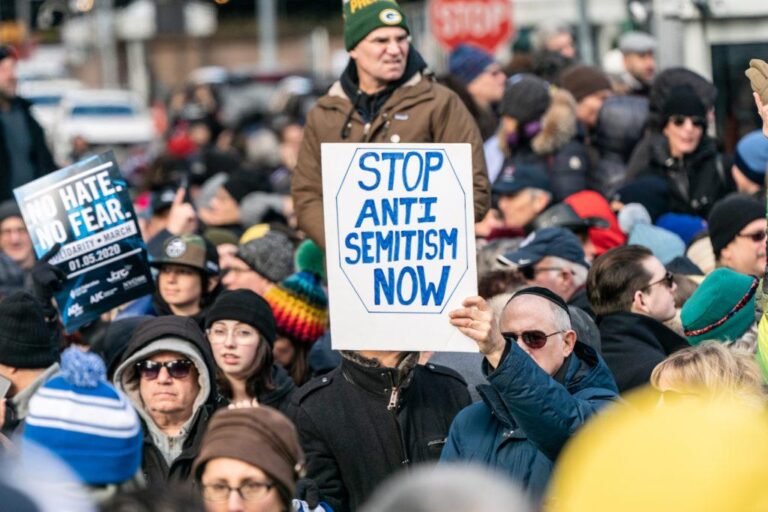Surge in Anti-Jewish Hate Crimes in the U.S.: An Urgent Call for Action
Nationwide Escalation of Anti-Jewish Hate Crimes Sparks Concern
The Federal Bureau of Investigation (FBI) has recently disclosed a significant increase in hate crimes targeting Jewish individuals and communities across the United States, reaching levels not seen in recent history. This disturbing rise includes a spectrum of offenses such as physical assaults, property defacement, and intimidation tactics, which have collectively heightened anxiety within Jewish populations nationwide. Advocacy groups and community leaders are sounding the alarm, urging for enhanced protective measures and public education to address this growing menace. Experts emphasize that without a unified and strategic response, these hate-driven acts risk deepening societal fractures and undermining public safety.
Several critical factors have contributed to this upward trend:
- Escalation of extremist rhetoric proliferating both online and at public gatherings
- Deliberate targeting of Jewish neighborhoods and institutions with coordinated attacks
- Improved reporting accuracy revealing previously underreported incidents
FBI-Reported Anti-Jewish Hate Crime Statistics (2019–2023)
| Year | Number of Incidents | Year-over-Year Growth |
|---|---|---|
| 2019 | 838 | — |
| 2020 | 967 | 15.4% |
| 2021 | 1,195 | 23.6% |
| 2022 | 1,493 | 25.0% |
| 2023 | 1,710 | 14.5% |
Decoding the Drivers Behind the Rise in Anti-Semitic Acts
Investigations by law enforcement agencies and independent monitors reveal a multifaceted set of causes fueling the surge in anti-Semitic hate crimes. A prominent catalyst is the widespread dissemination of conspiracy theories on social media platforms, which often unjustly blame Jewish communities for various societal issues. The intensification of political polarization in recent years has further exacerbated identity-based tensions, with extremist factions exploiting these divisions to propagate hateful ideologies. Digital platforms have played a paradoxical role by both exposing users to harmful content and enabling rapid organization of extremist groups.
Primary contributors include:
- Widespread circulation of false narratives and anti-Semitic stereotypes online
- Economic uncertainties heightened by the COVID-19 pandemic and inflationary pressures
- Increased public visibility of extremist groups during protests and rallies
- Delays and challenges in law enforcement’s ability to respond swiftly and engage communities
Regional Variations in Hate Crime Increases (2023 vs. 2022)
| Region | Percentage Increase | Common Incident Types |
|---|---|---|
| Northeast | 35% | Graffiti, Threatening Messages |
| Midwest | 28% | Physical Assaults, Harassment |
| South | 15% | Property Defacement, Online Abuse |
| West | 42% | Verbal Threats, Hate Speech |
Consequences for Jewish Communities and Institutions Amid Heightened Security Needs
The Jewish population in the U.S. is facing unprecedented challenges as the frequency of hate crimes escalates. Synagogues, educational institutions, and community centers are compelled to bolster their security infrastructure, often allocating substantial resources toward advanced surveillance systems, controlled access points, and staff training for emergency situations. This shift not only strains financial resources but also impacts the communal atmosphere, as spaces once regarded as safe havens now require visible security measures.
Notable effects include:
- Increased deployment of security personnel and law enforcement presence during religious and cultural events
- Regularly conducted safety drills and educational programs to prepare community members for potential threats
- Psychological stress affecting all age groups, with a particular impact on youth and seniors, leading to a rise in demand for mental health support
- Strengthened cooperation between Jewish organizations and local authorities to enhance threat detection and information sharing
Security Enhancements and Incident Reports by Institution Type (2023)
| Institution | Security Measures Implemented | Reported Incidents |
|---|---|---|
| Synagogues | Security guards, metal detectors | 27 |
| Community Centers | Surveillance cameras, emergency preparedness drills | 14 |
| Jewish Schools | Visitor screening, perimeter fencing | 9 |
Comprehensive Approaches to Mitigate Hate Crimes and Foster Inclusivity
Tackling the surge in anti-Jewish hate crimes demands a holistic strategy that integrates education, law enforcement, and community collaboration. Police departments should prioritize specialized training to recognize and respond to hate crimes with cultural sensitivity, while enhancing partnerships with Jewish organizations to streamline incident reporting and victim assistance. Transparency in hate crime data and coordinated efforts among federal, state, and local agencies are essential to improving prevention and accountability.
To nurture a culture of inclusion, the following initiatives are vital:
- Embedding inclusive curricula in educational institutions that celebrate Jewish heritage and address the ramifications of prejudice
- Launching community engagement programs that encourage intercultural dialogue and shared experiences among diverse populations
- Advocating for robust legislation that enhances penalties for hate crimes and allocates resources for anti-bias education
Policy Focus Areas and Their Anticipated Benefits
| Policy Domain | Proposed Action | Projected Outcome |
|---|---|---|
| Education | Mandatory cultural competency programs | Enhanced empathy and awareness |
| Law Enforcement | Specialized hate crime units | Improved detection and intervention |
| Legislation | Stricter hate crime penalties | Greater deterrence |
| Community Initiatives | Interfaith and intercultural dialogues | Reduced prejudice and social tension |
Conclusion: Addressing the Escalation of Anti-Jewish Hate Crimes
The FBI’s data on the rising tide of anti-Jewish hate crimes highlights a critical challenge facing American society today. Combating this surge requires a coordinated, multi-layered response involving law enforcement, policymakers, educators, and community leaders. Sustained vigilance, transparent communication, and inclusive policies are essential to safeguarding Jewish communities and fostering a more tolerant and united nation.








